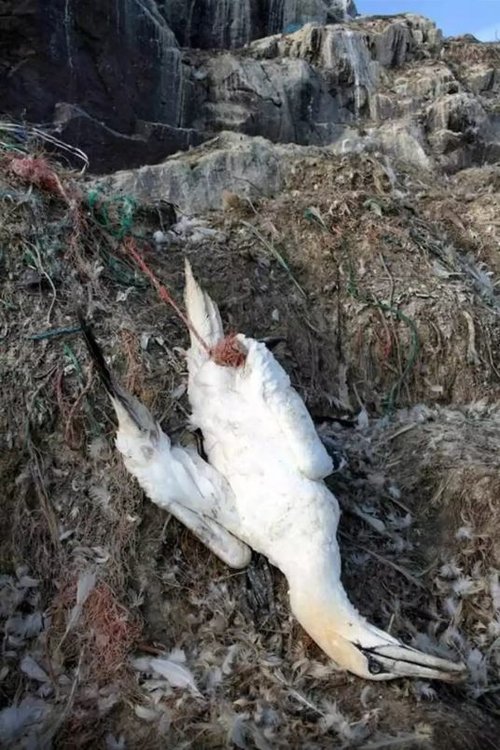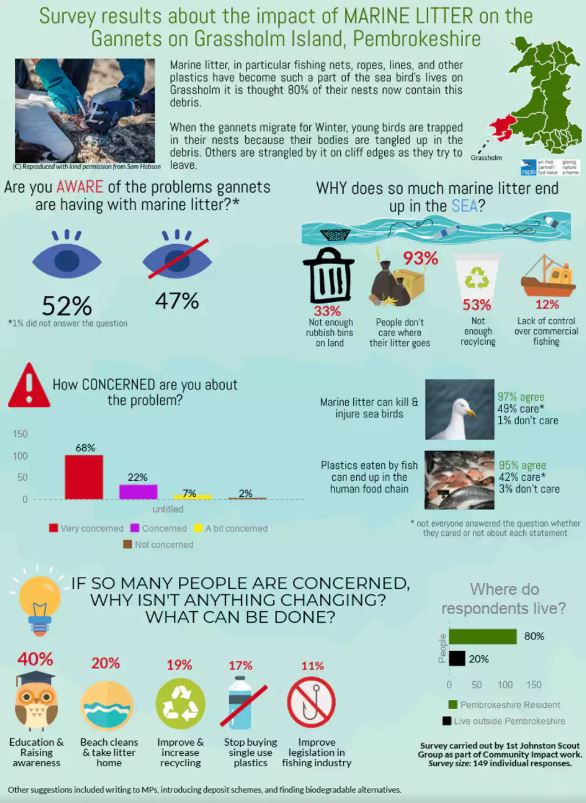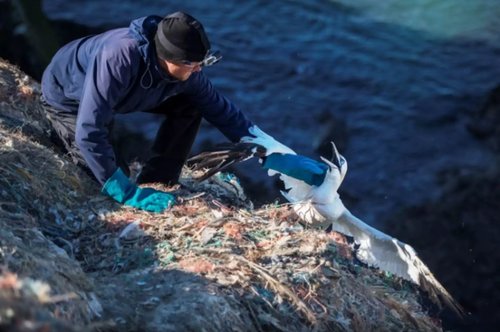Empowering young people to
take a stand
YRE - 국제대회수상작 · December 12, 2018
Category : article
Imagine travelling 4000km through storms and rough seas to reach a safe place to have your family, only to find materials there to build your home could injure or kill you all? This is the journey and frightening fact faced by thousands of Northern Gannet seabirds flying from West Africa to the island of Grassholm off the Pembrokeshire coast in West Wales, to lay their one egg.
For six months of the year this remote island is home to the only gannet colony in Wales and the third largest in the world.[1] All eyes are watching as they struggle in a fight against marine litter choking our oceans and the wildlife they support.
What’s happening?
When 39,000 breeding pairs of gannets arrive in Spring, swirling plastic litter like fishing nets, lines, ropes, and packaging is picked up by the birds to build their nests. They return to the same nest each year so the plastic can’t be removed. When they leave in September, the island becomes a graveyard of dead birds. Young ones are trapped as the plastic tangles around their bodies. Adult birds hang on cliffs, strangled by plastic.
How big is the problem?
RSPB site manager for Grassholm, Greg Morgan, explains why there is so much plastic in the sea bird’s nests:

“The gannets bring in fresh material from surrounding waters to add layers to their nests each year. They should be collecting seaweed but if plastic is floating on the surface that will be taken back to the nests. We estimate 80% of nests on the island now have plastic in them”.
Global problem, local impact – does anyone care?
Huge amounts of marine litter are brought on the Gulf Stream from the North Atlantic garbage patch (a massive pool of floating plastic litter) to the west coast of Wales, including Grassholm. Lots of the litter comes from different kinds of fishing, but it’s been discovered that a lot of what gathers around the Pembrokeshire coast comes from as far away as North and South America, Canada, and Africa. Do people from these places know their rubbish is turning up on our coastline? Would they care if they could see how the gannets are struggling to survive tangled in plastic? Do you care?
Northern Gannets are protected in the UK, so are they are under threat?
Surveys show bird numbers are increasing.[1] Some think the problem around Grassholm is tiny compared to what’s happening in the world’s oceans. With research saying plastic is getting into the human food chain, perhaps there is more to worry about?
“Grassholm is a small issue compared to what’s happening in the rest of the ocean”. GR, Fisherman
Yet surely dead and injured gannets on Grassholm flags up exactly what’s happening all over the world – showing that what we do can damage wildlife and sea creatures not just in our local environment but in other parts of the world. If we don’t see it, then perhaps we don’t care?
The gannet’s struggle is like what’s happening around the world. Oceans contain about 5.25 trillion pieces of plastic litter, 269,000 tons of which float on the surface.[1] Laws were made over 10 years ago to stop boats and ships dumping plastics and fishing gear into the sea, but how is this being checked?
Over 90% of seabirds have bits of plastic in their stomachs.[2] Who knows how much is in humans already?
What Pembrokeshire people think
Interviewing Pembrokeshire fishermen, the RSPB, and others it’s scary how much we need to do for people to see the gannet’s terrible struggle, to understand the knock on effect to our planet. Most local fishermen know about the problem. Some have helped injured gannets, but as one explained:
“Most of the equipment used in the fishing industry is plastic. We can’t go back to hemp, it’s just not good for what we need. I don’t know what can replace what we have that would be strong enough or resistant to corrosion from the salt water.”
This recent survey found people were very concerned about what is happening on Grassholm, feeling education could make the biggest difference.

Retired cargo ship Captain, John Zipperlen, was so disturbed by the amount of plastic ending up in the sea that he joined Global charity Greenpeace.
When cheap, strong plastic was invented, who thought about it taking so long or maybe never degrading, that it would kill our wildlife?
NEWS FLASH: Some Good News…
Programmes like Blue Planet are helping us think more about how plastic is filling our oceans. People are starting to complain and take action. Every year, RSPB visit Grassholm to free trapped birds. Here are more ideas to help:
How will we know we’re making a difference?

Gannet cliff rescue. ©Copyright Sam Hobson, reproduced with kind permission
We will start to see less plastic in the gannet’s nests, less birds trapped and dying on the island.
The situation for the gannets will only get worse unless we change our ways and dispose of all plastics properly.
If attitudes and actions don’t change, it will be ‘too little too late’ – not just for the gannets of Grassholm, but for the whole planet.
[1] https://ww2.rspb.org.uk/community/placestovisit/ramseyisland/b/ramseyisland-blog/archive/2017/10/20/grassholm-groundhog-day.aspx
[2] http://jncc.defra.gov.uk/page-2875
[3] https://news.nationalgeographic.com/news/2015/01/150109-oceans-plastic-sea-trash-science-marine-debris/
[4] www.plasticoceans.org
[5] http://www.fishingforlitter.org.uk/
Written by 1st Johnston Scouts from Wales.